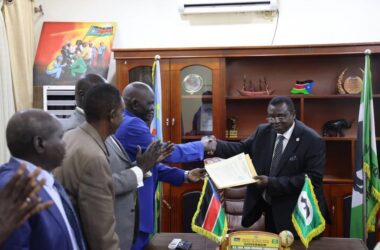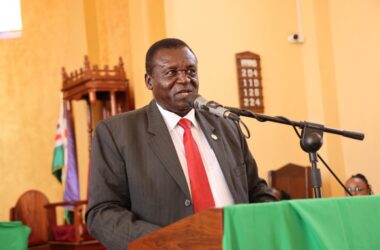By Manas James Okony
A gubernatorial decree, issued by Jonglei State governor, Riak Gai Kok on Wednesday evening, relocating Bor County headquarters from Bor Town to Baidit Town, has elicited reactions from residents.
A sparking debate loops on the implications for community dynamics, governance, and development in the county.
Since South Sudan’s independence in 2011, Bor Town has served as the administrative center for the state government as well as headquarters for one the nine counties.
However, governor Gai Kok cited Article 99(2)(a) of Jonglei State constitution as the legal basis for his relocation order, suggesting that such administrative changes are within the purview of state governance.
Meanwhile, critics haven’t left the decision untouched. Deng Mayen-Nyieth, a resident of Bor, for instance, views the move as politically motivated, saying it may exacerbate inter-communal tensions.
“The establishment of Bor County headquarters was decided through a consultative meeting in 2006, seconded by a community committee and approved by the then governor,” he explained.
According to Deng’s narrative, the agreed location for the county headquarters was Werkok, but due to insecurity, it was temporarily moved to Bor.
“If there was any decision to relocate the headquarters from Bor, it should have been done through community consultation. The rightful place should be Werkok, not Baidit,” Deng stressed.
Deng, who serves as a youth leader from Gok, emphasized that Werkok is centrally located and its proximity to Bor Town, was a significant factor in its selection as the county headquarters in 2006.
“There is no genuine reason to move the county headquarters to Baidit. If the decision is based on population, we are the more populous part of Bor. Also, Werkok connects all five Payams of Bor. It requires security and development, so the governor must reverse his decision; we don’t understand the criteria he used,” he said.
In contrast, Achol Jok, a resident of Baidit, expressed support for the governor’s decision. “As residents of Baidit, we are pleased with this decision. We believe relocating the headquarters to Baidit will promote security and development in our area,” he said.
Kuch Isaiah, a civil society activist with Jonglei Civil Society Network (JCSN), noted that public opinion is sharply divided over the relocation and called for a dialogue to address the concerns raised by both sides.
“This issue may create problems if not handled well. While those from Bor North welcome the relocation, critics view it as politically motivated,” he stated.
Kuch noted that contenders of the order, believe it is intended to deny Bor County revenues from ongoing surveys and income from the fishing industry.
He also queries the criteria of selection. “Additionally, questions arise as to why Baidit was chosen when Werkok is the designated headquarters? We urge dialogue to prevent further division within the Bor community,” Kuch argued.
The governor’s decision comes at a time Jonglei State is grappling with various challenges, including insecurity, lack of infrastructure, and economic disparities among different regions.
Reactions over the headquarters’ relocation reflect deeper issues related to governance, resource allocation, and community representation in a complex socio-political landscape.
As the people of Jonglei navigate this contentious decision, it remains crucial for state leaders to engage in dialogue and foster unity within the community to promote stability and development.




